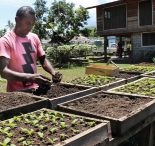
Organizing triangle exchange visits with technical trainings to FOs is a central service PIFON is developing for its members. The overall idea is to, on the one hand, promote specific knowledge and experience of some farmers’ organizations in different areas to host the exchanges and technical trainings, and on the other hand, to help organizations with less experience in those areas to go on visits to learn from those existing good practices.
During the first half of implementation of MTCP2, 14 learning and exchange visits were organized in six Pacific Islands and in two South-East Asian countries. These technical exchanges involved approximately 550 participants (including 200 women, 40 per cent, and 100 youth, 18 per cent) from 40 farmers’ organizations (all six NIAs, but also 34 additional farmers’ organizations within or outside the PIFON network); thus, about 2.2 per cent of members enjoyed direct benefits from training. Below are highlights of some of these visits and their benefits and positive outcomes for the participants:
Tonga on papaya production: a technical exchange was carried out between Tonga and Fiji in April 2015, which included a series of trainings on papaya production, costs and returns and value chain aspects. This training exchange was conducted by a commercial papaya farmer member of NWC/Fiji to the benefit of farmers’ organizations in Tonga, including its NIA, the Growers Federation of Tonga (GroFed). This initial training was supported by MTCP2 and led to three additional visits that the Tonga farmers’ organizations funded with other resources. The Tonga farmers have now quite advanced in developing their own value chain in papaya production.
Samoa on pineapple production: in 2014, PIFON initiated a farmer-to-farmer technical exchange visit production from Samoa to Fiji on year-round pineapple production and to provide information for farmers interested in establishing exports of pineapple from Samoa to New Zealand. A follow-up visit that was then organized in November 2015 and provided advice on practical solutions to secure continued development. The impacts recorded from this activity can already be seen on some pineapple farms in Samoa, including: (i) the natural cycle being broken on a number of farms, (ii) 65,000 – 70,000 plants being planted in stages and now ready to produce off-season fruit before the 2016 natural pineapple season in November/December 2016.

Fiji on vanilla production: as the NIA of Fiji for MTCP2, TTT has identified training needs that were to meet a strategic objective: providing support to its farmer members to diversify their crops as they have historically been focusing on cash crops like dalo and kava. This is why representatives from TTT and TRTC went on a scoping tour to Spices of Fiji, Wainadoi, to investigate the possibility of farming spices on Taveuni. As a result, demonstration plots were set up in Taveuni to showcase techniques to a large number of farmers.
The Medium Term Cooperation Program Phase 2 (MTCP2), a five-year capacity building program supported by International Fund for Agricultural Development (IFAD), Swiss Agency for Development and Cooperation (SDC) and European Union (EU), has been implemented in 19 countries across 3 sub-regions—Southeast Asia, South Asia, Pacific—engaging 1,544 sub-national farmer organizations with total membership of around 22 million women and men farmers. The funding support (total budget of $ 5 Million for whole duration of project across 19 countries) serves as a catalytic fund that will allow FOs to enhance their capacity to be effective channels of economic services to farmers. The program thus far have contributed to the formation of strong national platform of Farmers’ Organization with improved capacity to engage in policy processes and mobilize resources from mainstream agricultural development programs like extension services, credit and pre and post harvest facilities. the program also helped in transforming farmers association into commodity-based cooperatives to strengthen the role of the small-scale farmers within an inclusive and sustainable value-chain. The program is being implemented by the consortium Asian Farmers’ Association for Sustainable Rural Development (AFA) and La Via Campesina (LVC).

Comments are closed